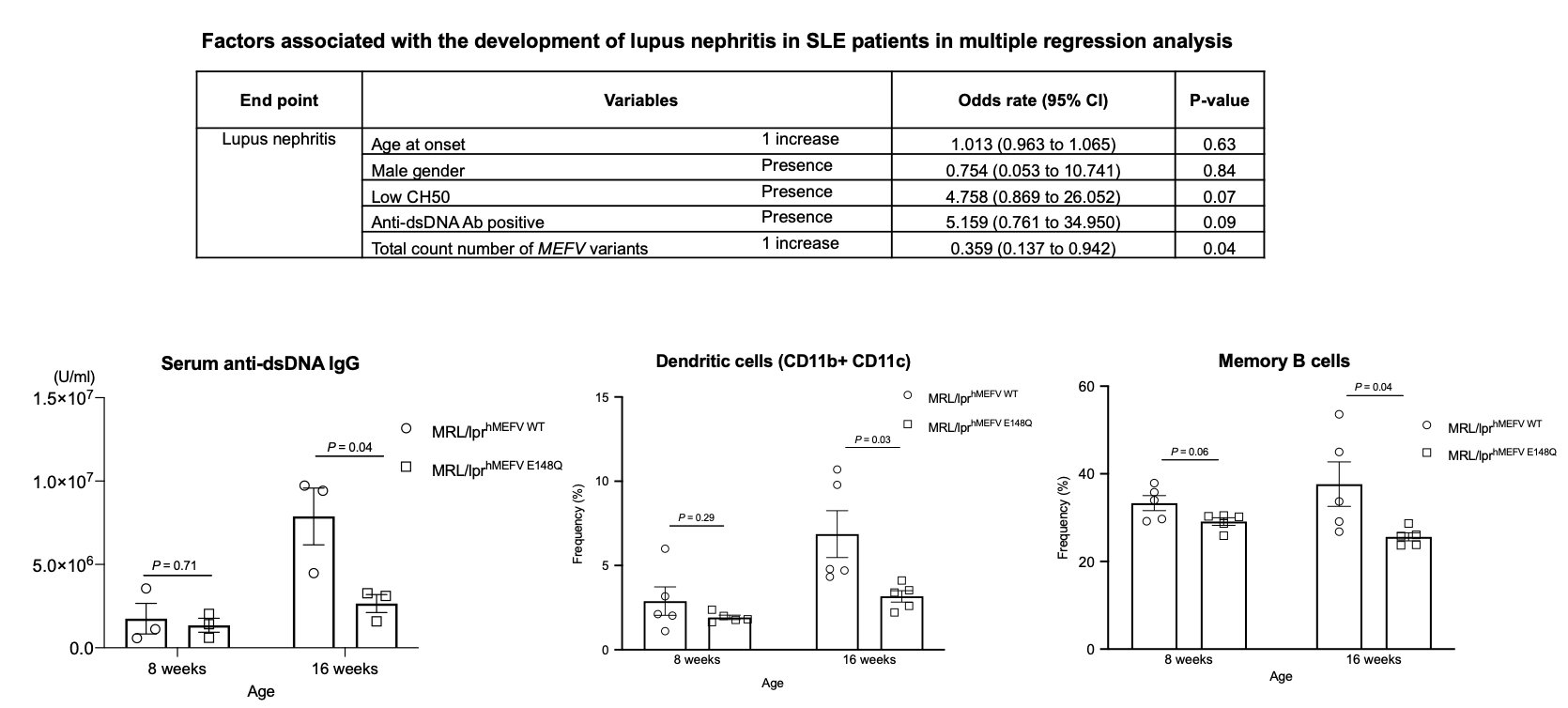Session Information
Date: Sunday, November 12, 2023
Title: (0543–0581) SLE – Diagnosis, Manifestations, & Outcomes Poster I
Session Type: Poster Session A
Session Time: 9:00AM-11:00AM
Background/Purpose: Previous studies showed that the prevalence of variants in Mediterranean Fever (MEFV) genes was lower in adult patients with SLE compared to healthy population and thatlow prevalence of coexistence of FMF and SLE was observed in several large FMF cohorts, suggesting that a potential protective effect of the presence of MEFV variants and/or FMF from SLE. Also, existence of MEFV variants have been suggested to modify clinical phenotypes of SLE. In particular, the presence of the E148Q variant in the exon 2 of MEFV gene may be protective for the development of lupus nephritis among adult patients with SLE. However, all these reports showing a relationship between SLE and MEFV gene are limited to those in the Mediterranean region, where MEFV exon 10 variants are relatively common.
Methods: We conducted a retrospective analysis of 55 Japanese SLE patients between January 2008 and April 2020 at Nagasaki University Hospital. We examined whether they have MEFV variants by next-generation sequencing in the whole region of MEFV. and compared clinical characteristics of the patients based on the presence or absence of MEFV variants. We introduced a partial segment of human exon 2 of the MEFV gene with or without E148Q variant, which is common variant in MEFV gene, into MRL/lpr mice and compared those phenotypes between MRL/lpr mice expressing the wild-type MEFV gene (MRL/lprhMEFV WT) and those expressing the E148Q variant (MRL/lprhMEFV E148Q).
Results: A total of 33 out of 55 patients with SLE had one or more variants in exon 1–5 of MEFV, whereas none of the patients had a mutation in exon 10. Patients with MEFV variants exhibited significant lower presence of lupus nephritis than those without MEFV variants (P=0.007). We counted the total number of MEFV variants exhibited in each patient. The total number of MEFV variants in patients with lupus nephritis was significantly lower than those without lupus nephritis (P=0.006). Among the factors analyzed including age at onset, male gender, low CH50, anti-dsDNA Ab positive, and the total count number of MEFV variants, only the total count of MEFV gene variants were significantly associated with the presence of lupus nephritis (odds ratio [OR] 0.359, p< 0.05). Consistent with the data from patients with SLE, MRL/lprhMEFV E148Q showed the tendency of less severality in lupus nephritis (not statistically significant) and showed significantly less autoantibody production (p< 0.05). These observed differences in disease phenotypes were suggested to be attributed by reduced induction of dendritic cells (p< 0.05) followed by a decrease in memory B cells (p< 0.05).
Conclusion: Presence of MEFV variant can modify clinical type of SLE and be a protective factor against the development of lupus nephritis.
To cite this abstract in AMA style:
Endo Y, Koga T, Kawakami A. Presence of Mediterranean Fever Gene Variants Provides Protection from the Development of Lupus Nephritis in Patients with Systemic Lupus Erythematosus [abstract]. Arthritis Rheumatol. 2023; 75 (suppl 9). https://acrabstracts.org/abstract/presence-of-mediterranean-fever-gene-variants-provides-protection-from-the-development-of-lupus-nephritis-in-patients-with-systemic-lupus-erythematosus/. Accessed .« Back to ACR Convergence 2023
ACR Meeting Abstracts - https://acrabstracts.org/abstract/presence-of-mediterranean-fever-gene-variants-provides-protection-from-the-development-of-lupus-nephritis-in-patients-with-systemic-lupus-erythematosus/

